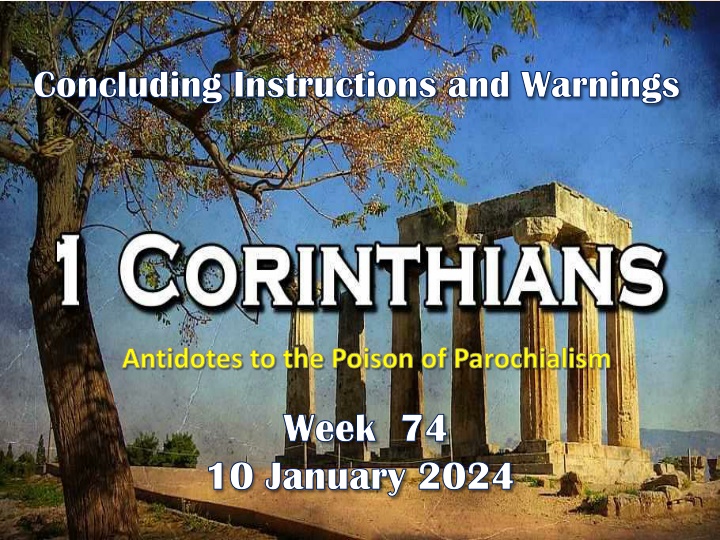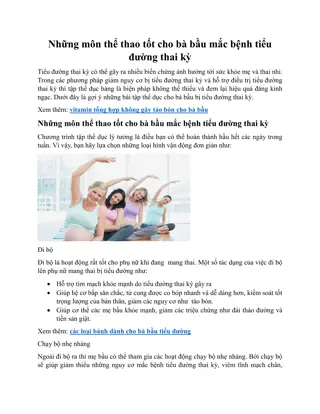
Antidotes to the Poison of Parochialism in 1 Corinthians: Concluding Instructions and Warnings
"Explore the theme of Christian conduct in the local church in 1 Corinthians, focusing on unity, discipline, and spiritual growth. Discover how the Corinthians were challenged to look beyond their local problems and consider broader needs, emphasizing solidarity and cooperation within the Christian community."
Download Presentation

Please find below an Image/Link to download the presentation.
The content on the website is provided AS IS for your information and personal use only. It may not be sold, licensed, or shared on other websites without obtaining consent from the author. If you encounter any issues during the download, it is possible that the publisher has removed the file from their server.
You are allowed to download the files provided on this website for personal or commercial use, subject to the condition that they are used lawfully. All files are the property of their respective owners.
The content on the website is provided AS IS for your information and personal use only. It may not be sold, licensed, or shared on other websites without obtaining consent from the author.
E N D
Presentation Transcript
Concluding Instructions and Warnings Concluding Instructions and Warnings Antidotes to the Poison of Parochialism Week Week 74 10 January 2024 10 January 2024 74
1 CORINTHIANS INTRODUCTION As we conclude our study in First Corinthians, remember the theme of this letter is Christian Conduct in the local church and how it influences unity,discipline,andspiritual growth. The primary issue in Corinth was Progressive Sanctification, that is, the development of holy character and the application of Christian principles and discipline, individually and corporately. So the entire letter was meant to correct behavior rather than doctrine. In Concluding Instructions and Warnings, Paul turns the Corinthian s attention from their own problems to the church s needs beyond their borders. He gives them insight into the church s sense of solidarity, cooperation, and support for one another within the Christian community, tells them they are just a small part of a larger faith community, then challenges them to look pass their biased focus, where they will see what they can do to help others overcome trials and hardships.
1 CORINTHIANS INTRODUCTION Moving from the controversy and strong reproofs that characterized the first fifteen chapters. Paul concludes this great epistle by encouraging the Corinthians to look up from their local problems, gain some perspective on their pettiness, and see the greater needs in the world around them. Suggesting that . . . as the dire and urgent needs of those outside their church walls become the focus of attention rather than their own selfish concerns, they will begin to see that the church is bigger than their own congregation and that the mission transcends their own ministries. In Concluding Instructions and Warnings (16:1-24), Paul shifts from a stern rebuke to some practical exhortations and warnings. He gives instructions on how to give, how to plan and how to work with others, emphasizing the value of face-to-face interaction; and exhorting the church to stand firm in their faith with love for the Lord and hope for His coming.
1 CORINTHIANS - LESSON OVERVIEW Swindoll opens this study by saying . . . It doesn t take days of around-the-clock observation to recognize that the Corinthian Church suffered from acute selfishness and sectarianism. Rather than loving unconditionally and contributing to the point of personal sacrifice, they pursued their own interests (10:24, 33; 13:5). Instead of banding together as fellow soldiers on the spiritual battlefield, they huddled in their self-designated squadrons and fought with each other (1:12; 3:4; 11:18). These same conditions plague many churches today. As congregation become inwardly focused, they lose sight of their outward mission.
1 CORINTHIANS - LESSON OVERVIEW This leads to a narrow ministry scope, as the problems and concerns of the individual local church takes center stage, and because nobody sees eye-to-eye on everything, special interest form and conflict ensues. Before you know it, hostility replaces harmony and open conflict stains the congregation, pitting believer again believer over some of the most inconsequential things imaginable. Nonetheless, Paul knew that the poison of parochialism can be countered with a few antidotes. In short, the Corinthians needed a fresh dose of global awareness to cure their obsession with local problem.
1 CORINTHIANS 16:1-4 1Now concerning the collection for the saints, as I have given orders to the churches of Galatia, so you must do also: 2On the first day of the week let each one of you lay something aside, storing up as he may prosper, that there be no collections when I come. 3And when I come, whomever you approve by your letters I will send to bear your gift to Jerusalem. 4But if it is fitting that I go also, they will go with me.
1 CORINTHIANS 16:1-4 Before examining these opening words in chapter 16, we return briefly to the closing words in 15:58. Paul begins chapter 16 with a Greek construction that indicates a moderate contrast: peri de, Now concerning. Paul had previously used this phrase to indicate either a complete change of topic or a transition to a different issue within a topic. Although, he clearly moves on to a different subject the collection for the saints (16:1) his previous exhortation sets the context : Therefore, my beloved brethren, be steadfast, immovable, always abounding in the work of the Lord, knowing that your toil is not in vain in the Lord (15:58).
1 CORINTHIANS 16:1-4 The Corinthians were to thrive in doing the Lord s work, persevering in whatever they set their hearts and minds to, since their efforts would not go unnoticed by a just and all- knowing God who will one day reward their faithfulness. So their attitudes and actions toward contributing to the collection (16:1) were to be no different: steadfast, immovable, always abounding. In referring to the collection for the saints, Paul has in mind not simply the regular giving to the church s normal ministry funds, but to a special collection designed for a particular purpose. This collection involved numerous churches in the project including the churches of Galatia (16:1)
1 CORINTHIANS 16:1-4 The money was to go to the body of believers in Jerusalem, to aid the saints who were suffering financial hardship (16:3). Because this was above and beyond their normal regular giving, Paul reminds them that they are to contribute to the special offering as each may proper (16:2) that is, according to their ability. Some could give more, some less. Finally, Paul made special arrangements for the transport of this offering to those in need (16:3-4), indicating the uniqueness of this opportunity to bless others. In these verses, Paul touches on a number of important principles regarding giving.
1 CORINTHIANS 16:1-4 These principles, for giving, are more thoroughly fleshed out in 2 Corinthians 8-9. However, we will highlight a few of them below. FIRST giving should be systematic. Paul urges the Corinthians to set aside money for this offering each week (16:2). This may refer to the weekly gathering for Sunday worship (Acts 20:7), but it also indicates thoughtful planning setting aside the firstfruits of one s earnings at the beginning of the week. This was not supposed to be a spare change, last minute offering when Paul arrived. He urges careful, conscious, and deliberate giving. This is why he tells them to systematically or regularly put aside and save (16:2).
1 CORINTHIANS 16:1-4 SECOND giving should be an individual matter according to one s ability. Paul says, every week each one should support the Jerusalem relief fund, not just the particularly wealthy or these who are overly sacrificial. Not just people with personal connections to the brothers and sisters in Jerusalem. Everybody was to get involved in giving something into the offering for those in need far away. This didn t mean that each member of the Corinthian congregation was expected to give the same amount. Instead Paul says that each should give as he may prosper (16:2).
1 CORINTHIANS 16:1-4 While the amount of their weekly wages might differ, drastically, all of them should have the same attitude toward giving: as an expression of thankfulness for whatever the amount of the Lord s blessing. THIRD giving should be a private matter, not a public spectacle. Paul did not want to employ marketing gimmicks, tacky fundraising stunts, or strong-arm tactics. Paul did not do anything that would compromise each believer s personal decision about giving. In fact, he made it a point that no collection be made when he arrived in Corinth (16:2). The envelope containing each believer s offering should be sealed. Paul was particularly discreet when it came to handling the Corinthian Church s pooled offering.
1 CORINTHIANS 16:1-4 He wanted no personal part in collecting it, counting it, or delivering it. He would, however, put his seal of approval on whomever they chose to deliver it, accompanying them himself if the gift were larger enough (16:3-4). Paul just scratches the surface on giving in this letter. His detailed treatment of money will come in his next letter to the Corinthian church. Nevertheless, by turning the Corinthians attention toward the desperate needs of the church in Jerusalem . . . And by calling on them to contribute to the cooperative efforts of other churches in the larger body of Christ, Paul seeks to correct their long-standing habit of selfishness.
1 CORINTHIANS 16:5-12 5Now I will come to you when I pass through Macedonia (for I am passing through Macedonia). 6And it may be that I will remain, or even spend the winter with you, that you may send me on my journey, wherever I go. 7For I do not wish to see you now on the way; but I hope to stay a while with you, if the Lord permits. 8But I will tarry in Ephesus until Pentecost. 9For a great and effective door has opened to me, and there are many adversaries. 10And if Timothy comes, see that he may be with you without fear; for he does the work of the Lord, as I also do. 11Therefore let no one despise him. But send him on his journey in peace, that he may come to me; for I am waiting for him with the brethren. 12Now concerning our brother Apollos, I strongly urged him to come to you with the brethren, but he was quite unwilling to come at this time; however, he will come when he has a convenient time.
1 CORINTHIANS 16:5-12 After urging the Corinthians to prepare their special financial assistance prior to his arrival (16:3-4), Paul moves into a brief discussion of his anticipated itinerary. In these verses he exhibits the high value he places on personal, one-on-one discipleship . . . Highlighting his anticipated visit, Timothy s on-the- ground work among them, and the hoped-for arrival of Apollos. Just emphasizes Paul s preference for being personally presence as a means of authentic discipleship. Paul shared his travel plans to visit Macedonia (16:5), then travel on to Corinth to visit them in person. Still some in Corinth doubted that he would ever come, even though his intention to come was laid out his set itinerary (4:18-19).
1 CORINTHIANS 16:5-12 The church in Corinth was not just a layover on Paul s journey. Paul hoped to roll up his sleeves and get involved in their lives for an extended period of time, if the Lord permits (16:6-7). Paul s day-to-day plans were always subject to the Lord s will, but he still exhibited a firm resolve to engage in face-to- face ministry with his spiritual children in Corinth. But, for the time being Paul had to complete his ministry work in Ephesus until Pentecost (16:8). Even though his ministry in Ephesus was fraught with opposition (16:9). A door of great opportunity had opened there. So, while Paul completed his work in Ephesus, he sent his close ministry associate Timothy to Corinth (16:10).
1 CORINTHIANS 16:5-12 He encourages the church to accept Timothy just as they would accept him, by showing proper respect and hospitality to his fellow-worker in the Gospel. The previous conflict in Corinth over Paul s apostolic authority, gave him a reason to worry that Timothy s reception might be marred with awkward discomfort or even outright rejection (16:10-11). Therefore, Paul goes out of his way to urge them to send him on his way in peace, that is, with the blessing of the church both spiritually and financially. Paul implies, not only was the church to provide for his temporal needs while he visited them in Corinth, but they were expected to provide assistance for Timothy s trip to Ephesus.
1 CORINTHIANS 16:5-12 Lastly, Paul mentions Apollos again one of their favorite teachers from the early days of their founding (1:12). Paul had greatly urged Apollos to visit Corinth, he had declined until a more opportune moment (16:12). Paul mention of this interaction with brother Apollos over strategic ministry matters, indicates the essential unity between Paul and Apollos. These men saw each other as ministry partners, not competitors, so their disciples should see them in the same light (3:4-6). By recognizing that the ministry transcends their own city limits, the Corinthians would overcome their sectarianism and see themselves as one small part of a larger global body of Christ.
1 CORINTHIANS 16:5-12 By seeing themselves as part of the global body of Christ, they would see that Paul had a fruitful ministry in Ephesus. That Apollos s love for the brethren extended beyond his fans in Corinth. That Timothy, relatively unknown to the Corinthians, deserved as much respect as Paul because of his labors for the gospel far and wide. Once the Corinthians could see their place in a larger worldwide church. They would be able to become partners for ministry to others rather than freeloaders of ministry from others.
APPLICATIONS OF THE LESSON Putting Money to Work for Ministry
APPLICATION PUTTING MONEY TO WORK FOR MINISTRY In closing Swindoll shares . . . It has been said that money can buy us anything but happiness and take us everywhere but heaven. It is both a cause of evil, for those pursuing it with passion, and an effect of evil for those who acquire it by unlawful means. In the coffers of the wicked it can lead to great destruction, but in the hands of the righteous it can bring great good for many. In our money crazed world, the importance of money can be greatly exaggerated. The truth is, there are many things in this world money simply can t buy.
APPLICATION PUTTING MONEY TO WORK FOR MINISTRY Money can t buy intelligence, just an education Money can t buy wisdom, just experience Money can t buy health, just medicine Money can t buy a family, just a house Money can t buy friendship, just companionship Money can t buy love, just sex. That is not to say money has no role to play in life. Like air itself, nobody can live in our modern world without money. As Paul points out in verse 1-4, without reliable financial support, Christian ministries would peter out. Churches would close their doors. Bibles would not be printed. Christian organizations would be abandoned. While money can t buy the blessings of God, money itself can be a blessing both to the giver and to the recipient.
APPLICATION PUTTING MONEY TO WORK FOR MINISTRY So, as we near the end of our study in First Corinthians, Paul gently stresses the importance of financial giving. That giving is not simply for our local churches, where we see direct benefits for ourselves and our families. Rather the kind of giving Paul describes here is part of a larger context of awareness of, and involvement in, ministry beyond our narrow context in the global body of Christ. The church in Corinth was called to contribute to meeting the needs of many people whom they would never meet, and to show hospitality toward ministers they hardly knew (16:10-11). Neither of these contributions would result in tangible benefits for the church in Corinth itself or for its members.
APPLICATION PUTTING MONEY TO WORK FOR MINISTRY However, Paul makes it clear that our giving should reach beyond our own local churches and into the lives of believers around the world. So, how about you? Have you unwittingly succumbed to limiting your giving to ministries that benefit only you, your family, or your church? Would Paul be pleased with your giving patterns, or would he exhort you to engage in a broader ministry beyond the walls of your church and your own immediate concerns? One of the best ways to examine your giving is to review your charitable donations. Go through your checkbook, debit statements, and bank accounts. Jesus said, where your treasure is, there your heart will be also (Matt. 6:21), take some time to evaluate where your treasure is actually going.
APPLICATION PUTTING MONEY TO WORK FOR MINISTRY Where do you invest your finances? What percent of your monthly income goes to necessities? What percent toward luxuries? Toward frivolities? Are you giving regularly to your local church s ministry or withholding even that? Beyond your local church, do you give to other God-honoring ministries? Carefully think through these questions and, if necessary, make some changes in your giving patterns. Admittedly, you may not be able to see, hear, or feel the direct benefits of your giving when you choose to bless believers and ministries beyond your own horizons. But do not forget the words of the Lord Jesus: It is more blessed to give than to receive (Acts 20:35).
NEXT CLASS 17 January 2024 Before next class, read the below chapters in Before next class, read the below chapters in the the NKJV NKJV and in one other versions of the Bible, and in one other versions of the Bible, i.e., i.e., KJV KJV, , NRSV NRSV, , NIV NIV, , CEV CEV, , etc etc Chapter 16:13 24 Standing Firm To The End






















